|
Last month players were asked to count
all the DARK
PINK bunnies. And
Yes, it was a trick question. Congratulations to those who figured out
the puzzle! Unfortunately that was only one person. So instead of only
awarding the winner, I’m going to reward everyone who
participated.
Please message us using the contact link, with your player name and we
will send you your reward shortly.
Hawk
Kholran
TruckerChick
JellyBean
MsBecks
DottieDottie
 BY
GUNIVEER
BY
GUNIVEER
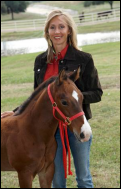
Star Wars, The Island, Jurassic
Park…Charmayne
James? When a person
thinks of cloning, an 11 time barrel racing champion certainly
doesn’t
come to mind.
Clayton is a healthy young 2006 bay
quarter horse
stallion. Scamper is an aging 1977 bay AQHA gelding. On the surface, it
seems these two horses are only similar due to their coloring, and even
that has it’s limits. Clayton has a connecting star and snip,
Scamper
has a slight shadow of white. They even share the same owner, but they
also share DNA.
After retiring from competition in
2003, James
began to focus solely on her quarter horse breeding program. The
problem? The horse that brought her to 10 of her 11 championships was a
gelding, unable to breed. Scamper was the epitome of a champion,
proving so by being the first barrel racing horse to be inducted into
the ProRodeo Hall of Fame. If he wasn’t going to be able to
provide
future champions for her, she would have to find his
clone…litterally.
In August of 2006, Clayton was born with the help of ViaGen who charge
a whopping $150,000 for their cloning surfaces. Cloning is the process
by which an identical DNA specimen is created by replacing the nucleus
of a surrogate egg with the genes of the specimen you wish to duplicate.
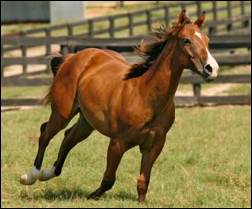 Photos provided
by ViaGen shows the cloned horse, Clayton, with owner
Charmayne James near Boerne, Texas.
Photos provided
by ViaGen shows the cloned horse, Clayton, with owner
Charmayne James near Boerne, Texas.
Second Photo by Candace Dobson, Gunslinger, LLC.
This
astounding breakthrough in the equine industry raised many questions
and concerns. What would be the benefit of using Clayton as a breeding
sire? Could his foals be registered? Is Clayton healthy, and will his
foals be? Breeding to Clayton would be the same as breeding to any
other stallion. He’s a replica of Scamper with all the
qualities
of a
champion barrel racer, but with the ability to pass on those traits to
another generation. Currently the AQHA does not recognize cloned
horses, therefore Clayton and his get would be unregisterable with that
particular association. Clayton is as healthy as the average horse, and
that isn’t planned to change anytime soon, even for his
offspring.
And for a fee of $4,000, you can have
a foal from
Scamper…er Clayton.
|

|
In March to
celebrate St. Patricks day, Orbis Newsletter staff created
two quizzes based on Irish dog and horse breeds. The winners of the
quizzes were to have their names posted in the newsletter, and be
awarded with a special graphic for their main game page. However
it’s
been two months now and we have had no winners! Maybe I made them to
hard. We already extended it one month, so I will end the suspense and
give you all the answers: |
Irish
Dog Breed Quiz
Q: This
breed
most likely arrived with the Celts and has been refined over the years
with crosses to the Southern Hound and French Hounds.
A: Kerry
Beagle
Q:
This
breeds hair is similar to that of fine human hair and like human hair
is not shed but continues to grow throughout the year.
A: Irish
Terrier
Q:
These
dogs must have something to do since lack of activity will lead to a
bored, destructive, or even hyperactive dog.
A: Irish
Setter
Q:
Most
puppies of this breed are born dark and have a coat of either red,
brown, or mahogany. As they age they lighten up into a cream color.
A: Soft
Coated Wheaten Terrier
Q:
This breed is very old, possibly from the 1st century BC or earlier.
A: Irish
Wolf Hound
Q:
This
breed has four coat varieties for this dog: Traditional Irish, Heavy
Irish, English, and America.
A: Soft-Coated
Wheaten Terrier
Q:
The over use of hunting with this dog resulted in boar and wolves
becoming extinct from Ireland.
A: Irish
Wolf Hound
Q:
The red, harsh double coat protects this dog from well in all kinds of
weather.
A: Irish
Terrier
Q:
Their coat is long and silky, mostly white, with deep red patches. -
Irish Red and White Setter
Q:
The coat of the ___________________ consists of dense curls.
A: Kerry
Blue Terrier
Q:
In the 1800 s this dog breed was, red, lemon, and red with white.
A: Irish
Setter
Q:
Drag and Drop the breed with the correct description
- Irish Wolf Hound: bred as war dogs by the Celts
- Irish Water Spaniel: the largest type of gun dog
- Kerry Blue Terrier: the national god of Ireland
Q:
This is the national dog of Ireland.
A: Kerry
Blue Terrier
Q:
Drag and Drop the breed with the correct description
- Kerry Blue Terrier: pups are born black and silver as they age
- Irish Water Spaniel: their coat consists of dense curles
- Irhs Terrier: first native terriers of the english kennel club
Q:
This breed was developed to control vermin including rats, rabbits,
badgers, foxes, otters and hares.
A: Kerry
Blue Terrier
Q:
The __________________ often called the Irish Blue Terrier.
A: Kerry
Blue Terrier
Q:
This breed has “rat like” tails.
A: Irish
Water
Spaniels
Q:
Which Breed of dog is Irish and not seen in VitrualPups.com.
A: Irish
Glen of Imaal Terrier
Q:
The historic motto of the ________________ is "Gentle when stroked.
Fierce when provoked."
A: Irish
Wolf Hound
Q:
The
_____________ were the first members of the terrier group to be
recognized by the English Kennel Club as a native Irish breed.
A: Irish
Terrier
|
Irish Horse Breed Quiz
Q: In
the
1700 s Arabian blood was added to which breed?
A: Connemara
Q:
Their stud book was established in 1926.
A: Connemara
Q:
Clydesdales were used in this breed, but they didn t contribute quality
characteristics.
A: Irish
Draught
Q:
Which breeds name means descendants of Con Mhac, of the sea?
A: Connemara
Q:
Drag and Drop the breed to the correct description
- Connemare: fine head with small ears and slightly dished profile
- Kerry Bog Pony: traditionally used for hauling peat fule
- Irish Cob: also called gypys and Tinkers
Q:
The conformation and type of these breed is uncannily similar to the
Morgan horse.
A: Kerry
Bog
Pony
Q:
This breed is bred to incorporate a kindness and tolerance that is
acceptable for a family animal. -
A: Irish
Cob
Q:
Pinto patterns are not acceptable in the registry.
A:
Connemara
Q:
True or false Ireland does not have any true native horses?
A: True
Q:
True or False The Kerry Bog Pony, is a competitive sport horse?
A: False
Q:
Historians can traces theses horses back as early as 600 BC.
A: Irish
Cob
Q:
The _____________ is considered the farm horse of Ireland.
A: Irish
Draught
Q:
Check only the correct facts about the Kerry Bog Pony.
- Pinto patterns are acceptable in the registry
- By 1994 there were only 20 ponies left in the whole of Ireland
Q:
The _________ cob is also called Drum, Gypsy and Tinker.
A: Irish
Q:
The _________ was developed from Scandinavian ponies that the Vikings
brought over.
A: Connemara
Q:
This horse is crossed with Thoroughbred blood, or another European
Warmbloods.
A: Irish
Sport Horse
Q:
This breed was crossed with Hackneys and Thoroughbreds.
A: Connemara
Q:
This breed averages 10 to 12 hands in height.
A:
Connemara
Q:
The _________ has a fine head with small ears and usually a slightly
dished profile.
A: Connemara
Q:
This breed has to be at least 1/4 registered Irish Draught.
A: Irish
Sport Horse
Thank
you everyone for taking the
March Madness Quizz!
|
|
|
 BY JNFERRIGNO
BY JNFERRIGNO
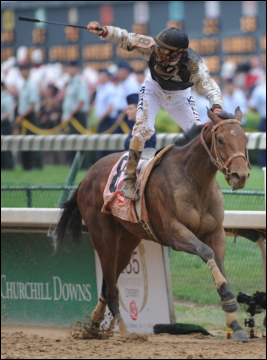
Over 150,000
people flock to Churchill Downs the second Saturday of
every May, bringing an end to the two-week-long Kentucky Derby Festival
held in Louisville. May 2nd marks the first leg of the Tipple Crown and
the most exciting 2 minutes any sport can offer, marking it as the
135th one and a quarter mile race open to colts, geldings, and fillies.
At
the time of writing this story, this years favorites appeared to be
Pioneerof the Nile (8-5-0-1), Desert Party (6-4-1-0), I want Revenge
(8-3-1-4), and Quality Road (4-3-1-0). For those that don’t
know what
these numbers mean, let me explain: First number is the number of
starts, Second number is the number of firsts, the Third is the number
of seconds), and the last is the number of thirds.
The total
value of the race was over $2million dollars, and of the favorites only
Pioneerof the Nile came in second. I Want Revenge came up lame that
morning and was scratched. Desert Party ranked 14th, and Quality Road
never entered due to a crack in his hoof.
Mine That Bird wiped
the track with the other Thoroughbreds, turning the Kentucky Derby into
two races. There was no doubt that once Mine That Bird got his head, he
wasn’t going to stop, so the race became one for Second Place
between
Pioneerof the Nile, Musket Man, and Papa Clem.
His jockey,
Calvin Borel, also rode my favorite Rachel Alexandra to first, in the
Kentucky Oaks the previous day. Mine That Bird was a 50-1 shot, who had
never won on dirt before, and came to win by a stunning 6 3/4 lengths!
This power-horse went from last, to zoom past the favorites, and really
opened up along the stretch.
Spectators commented on how
Borel’s ride in this years Derby, resembled the 2007 ride on
Derby
winner Street Sense. Middle Eastern owned Pioneerof the Nile never knew
what hit him as this duo flew past.
After being shaken up by
Mine That Bird, Pioneerof the Nile had to contend with another
power-horse Papa Clem, who had been surging upwards after a good start.
Battling it out down the stretch with Papa Clem and Musket Man,
Pioneerof the Nile prevailed to win runner-up honors by a nose, not
what his owners had expected, but better then the rest of the track
–
excluding Mine That Bird that is.
After being given the
garland made up of nearly 400 roses, owners of Mine That Bird paid
tribute to the 2006 Derby winner Barbaro, who’s sculpture
stood in
front of the Churchill Downs’ Gate 1 entrance. Visitors
coming to the
Barbaro Memorial and Kentucky Derby Museum the day after the race, got
to take a little something of Mine That Bird home with them as co-owner
Mark Allen and trainer Chip Woolley handed out roses from the champions
garland. “We just want to show how important horses really
are. That's
what this is all about. We want people to know just how important these
horses really are to us. They're not just animals, they're a part of
us.”, said the winners trainer. 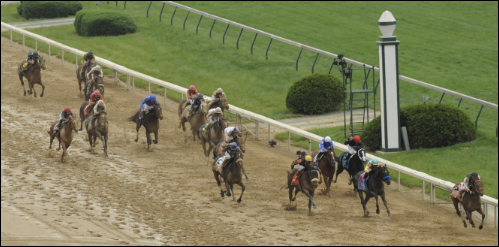
Owners Mark Allen of Double
Eagle Ranch and Dr. Leonard Blach of Buena Suerte Equine, announced
that they will be taking Mine That Bird to Maryland to run the
$1million dollar Preakness at Pimlico on May 16th.
It appears
this horse was overlooked by the media, maybe because he
wasn’t built
for speed, but for stamina. In fact his entire pedigree suggests that
he’d have no qualms
about going the distance. But
we’ll never know till
he does. We’ve seen the Triple Crown eat great horses alive,
or make
champions out of ones we didn’t expect. Mine That
Bird’s father was the
2004 Belmont winner, Birdstone who took the Triple Crown championship
away from Smarty Jones. Birdstone’s first foal crop is
showing up this
year with some promising prospects. Mine That Bird’s
half-brother
Summer Bird was also in the derby, but he came up 6th. Both are bred
for distance, and have a pedigree filled with winners from different
Triple Crown races. Mine That Bird is from the unraced mare Mining My
Own, as her first foal I think she did well. The mare is out of Smart
Strike, which makes her half sister to two-time Horse of the Year,
Curlin. Going back generations on Mine That Bird he’s
chock-full-o
distance. Will he have what it takes to go the other two legs of the
Triple Crown? |

BY
JNFERRIGNO |
|
 Making the
Kentucky Oaks Garland
Making the
Kentucky Oaks Garland
Last years
winner was three-year old Proud Spell, earner of $2,131,610 from 13
career starts before being retired. And in 2007, Rags to Riches won the
Oaks, as well as being the 3rd filly to ever win the Belmont, and the
first one since 1905. The Kentucky Oaks, which marks the first leg of
the Filly Triple Crown, has played host to all kinds of Queens. After
Rachael Alexandra’s May 1st performance spectators are
beginning
to
wonder if we have another Queen in the making.
This years
Kentucky Oaks looked to be a show down at first, but do to a number of
pulls and scratches it was a one-class-act line up. The favorite
fillies were Rachel Alexander, Stardom Bound, and Justwhistledixie who
latter was scratched due to an abscess in her left front foot. Stardom
Bound’s owners, IEAH Stables decided not to race the filly
after
a flop
workout one morning. So with the two fillies who could match Rachel
Alexander gone, what’s a girl to do? With the only
competition
out of
the field, no wonder she won by over 20 lengths.
IEAH Stables
had a second filly named Laragh already entered in the Oaks, but she
was later pulled to compete in the 25th running of the $115,300
Edgewood, and come out winning. She is half sister to Stardom Bound and
cousin to Rachel Alexander by the Irish champion Thoroughbred stallion
El Pardo. Some of you might be familiar with IEAH Stables, as they were
the owners of champion race horse Big Brown.
Had Stardom Bound
entered and been in her prime, she could have given Rachel Alexandra a
run for her money. Prior to the Oaks she was the only filly of this
field to win near $2million dollars in 8 races, finishing with 5
firsts, 2 seconds, and a third. Stardom Bound had a winning steak of 5
firsts until she was defeated by Hooh Why and Gozzip Girl in the
Ashland Race at Keenland. Her sire Tapid had a decent enough race
record, but was a disappointment in the Derby. His progeny however show
him to be a better stud then race horse. Her dam My White Corvette was
out of the very well-bed 3 times California stakes winner Tarr Road,
and she has had
Watch
Rachel
Alexandra run against the boys May 16th at the Preakness. Check your
local TV guide for times.
 BY
DRAGONWINGS
BY
DRAGONWINGS
Normally I'm selfish in my rants, but
the Hobbits
wanted me to remind everyone how our Furkids enhance our lives.
Furkids,
be they kitties, puppies, horsies, or a pet rock, aren't just animals.
My Hobbits aren't just lazy cats. They're great at finishing left
overs. They always attack and eat the killer moth that tries to flutter
across the tv during my favorite scene in a movie. They always let me
know when someone is at the door. ( they break into 4 part kitty
singing. ) Sam monitors toilet paper use. Frodo always reminds me to
clean my ears before I leave the house. Pip fancies his skills as a leg
warmer while I'm watching Frasier. Merry always knows when I need a
cuddle, need an opinoin, or need motivation.
I, like most pet
owners, go out of my way to make sure they have a roof over their
heads, food in their bowls, Places to pewp, and enough toys to keep
them entertained while I work. They get lots of love and cuddles, are
spoiled rotten, and most importantly, they think I make an amazing pet.
My
mother lost one of her 'babies' a few days ago. I just got off the
phone with her, and shes still a mess. Sometimes people don't
understand how attached we get to out pets, and in many cases they
aren't pets at all. They're one of the family.
When was the last
time you picked up a tennis ball and played fetch with your dog? When
was the last time you rubbed you cats belly for half of a movie?
The
Hobbits ask that you spend a few extra minutes with your pet. They also
ask that you send me cartons of cottage cheese, since they are no
longer allowed near the stuff. ( Don't ask. I wont even keep the stuff
in the house anymore because of what happens when Pip gets into it :/ ) |
three
previous foals, all of whom place in the money.
Rachel
Alexandra, the current racing favorite and champion filly of the
Kentucky Oaks, started her racing career in May of last year by coming
in 6th place in the Maiden Special Weight race at Churchill Downs.
Two weeks later she competed in that same race to come out on
top.
Since
then she has been in a total of 9 races, with 6 firsts, and 2 seconds.
She is by a $5.7million dollar earning son out of Irish champion El
Pardo, and a promising mare named Lotta Kim who’s outstanding
racing
career was cut short when a runaway horse almost cost her her life.
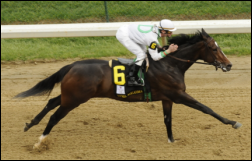 Photo
from the 135 Kentucky Oaks
Photo
from the 135 Kentucky Oaks
Unlike the Derby, which brought in 20
of
the best colts, the Oaks only had a race of 8. With a limited field,
and most the class to the side of the track or not entering.
It’s
not
surprising the power-horse Rachel Alexander kept on going.
Every
Derby season, the community of VHR typically favors one particular
horse. And with Rachel Alexandra scheduled to run in the Preakness now,
I wonder if this girl will be the next idol of worship. A couple of new
things have happened in this fillies life this month: she won the Oaks
by 20 lengths, she was sold to new owners Harold T. McCormick and Jess
Jackson, and has a new trainer Steve Asmussen. The only thing that
appears to be consistent is her jockey, Calvin Borel who won the Derby
on Mine That Bird the following day. This might not be the smartest
career move on his part, seeing as he’ll be the first Derby
winning
jockey to switch horses for the Preakness since 1945. But in an
interview Borel had commented, “I think she's the best in the
country
right now.”
I often worry that the current
excitement and hype
of the racing season, causes people to overlook certain influences, or
historic events. I find that people use “worlds greatest
horse” and
other similar phrases to loosely. Not to take the spot light off of
Rachel
|
Alexandra, but by
three years of age, the world has seen a
number of Thoroughbred fillies who have accomplished more in that short
time.
Many historians will say Go For Wand
was one of
the best
fillies the 80's bought us, hands down. By two years old she was
already four-for-five and was given the 1989 Eclipse Award. The
following year she had raced a total of 12 times in her life time, with
10 firsts and 2 seconds, and was once again awarded the 1990
Eclipse
Award for Outstanding Three-Year-Old Filly. In the Beldame Stakes she
faced older fillies, and nearly shattered Secretariat’s track
record.
Unfortunately during the 1990 Breeders’ Cup while in the
lead,
she
shattered her right ankle. She lost but she finished the race, and had
to be euthanized on the spot.
Some followers of racing have
been comparting Rachel Alexandra to historic filly Lite Light,
who’s
time in the 1991 Kentucky Oaks matched that of Rachel Alexandra. It was
at this point that people thought Lite Light would never loose a race,
but in fact she lost her very next one.
2007 Kentucky Oaks
champion Rags To Riches went to play with the boys in the Belmont. It
had been over 100 years since a filly had won this race, and she came
out on top over all three Derby and Preakness winners.
The
list goes on, Bayakoa, Beldame, Busher, Dance Smartly, Genuine Risk,
Hollywood Wildcat, Personal Ensign, Serena's Song, Silverbulletday,
Shuvee , TaWee , Zarkava and Zenyatta. Just to name a small few. Rachel
Alexandra has just won her first Grade 1 stakes, has already had a
surgical operation, and hasn’t run against anything yet that
would give
reason to call her a champion. So lets wait and see what this filly has
to bring on May 16th.
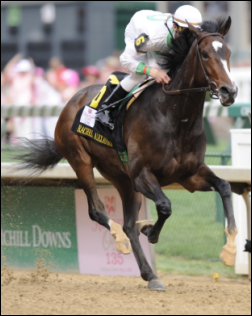 Rachel
Alexandra at the 135 Kentucky Oaks
Rachel
Alexandra at the 135 Kentucky Oaks |

BY JNFERRIGNO |
Greyhound racing is the sport most commonly thought of when discussing
dogs and the track. The general concept is the dogs chase a lure all
the way to the finish line on a dirt track, the first one that arrives
is the winner. In most countries lure racing is just done for
enjoyment, but in other countries it’s considered equal to
horse
racing, and these animals tend to be looked at as strictly a profit
maker. As a result Greyhound rescues are very popular these days.
Many
breeds can be used for racing, mostly sight hounds like the Greyhound,
Saluki, and Afghan hound. However other dogs are used for different
kinds of racing, like the Husky, or even the Dachshund. In some
competitions, like flyball, the ideal dog is actually a crossbreed, or
mutt. What is racing after all? It’s just setting two or more
dogs
against each other in a competition where time is graded. It can be on
a track like lure racing or dryland mushing, or on an obstacle course
like flyball. Objects like bikes, sulkies, carts, sleds, scooters, or
skies may be used to team the dogs with humans. Or the race may be on
natural terrain with no additional aids, such as Canicross, a popular
European cross-country running competition where owner and dog are a
team. Who would have thought that a leisurely jog |
with your dog in a
park would actually be a world wide sport? But then again, who in the
world thought of harnessing a dog to a scooter as a sport either.
Your
mushing sports vary based on season and location. During winter time
you have sled dog racing, and skijoring. The sport of skijoring, in
which a skier is pulled by something over a snow-covered course, is
popular wherever there is snow. The course can have jumps and ramps, or
just be flat. Some northern countries will have pulka races for fun,
which is similar to a weight pulling contest but the dogs start all at
once instead of being individually timed. Here a dog is required to
pull a small weighted toboggan (a low to the ground sled) along a flat
snow course. In summer and spring time when the ground isn’t
covered in
snow or slush, carting, scootering, and bikejoring contests may be
held. In these competitions dogs are still harnessed but trade in their
sleds for wheels.
Coursing sports typically involved a
live
animal, but now most have switched over to a lure. Dogs may run on a
single direction round closed off track, or out in an open field where
direction may change depending on the course layout. In these races you
see a wider varity of breeds then you do at the track, breeds like the
Borzoi, Whippet, and Deerhound are a familiar sight. There are even
little dog races for the terriers or doxies.
|
|
|

|
 |
|




